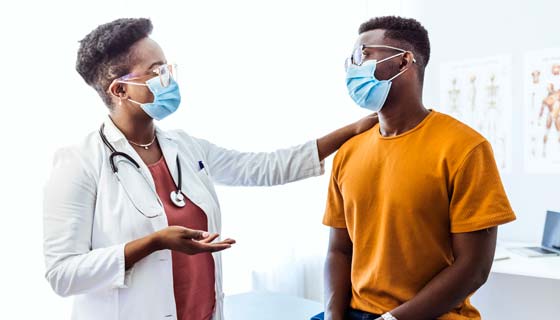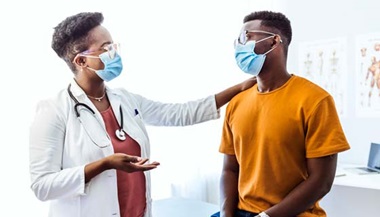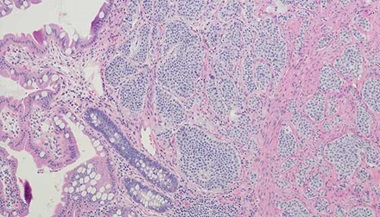Colon Cancer Survivorship
Your cancer journey will continue long after you’ve received treatment for colon cancer or treatment for rectal cancer—even if you are now living cancer-free.
Although cancer doesn’t have to define you, the disease changes your life in a number of ways. You’ll have to deal with the immediate and long-term physical effects of treatment, ongoing screening and monitoring, new concerns about staying healthy and a wide range of emotions.
This post-treatment period is called survivorship. While survivorship varies from patient to patient, there are some common concerns that often affect cancer survivors.
Colorectal Survivorship Clinic
You are a cancer survivor from the moment you are diagnosed. The fact that you have had cancer will change your life, but cancer does not have to define you.
Treatment for colon cancer can include surgery, chemotherapy, and radiation. These forms of treatment can cause side effects that you experience temporarily while going through it. Oftentimes, these treatments can cause long lasting effects that impact your everyday life.
Surveillance for Colon or Rectal Cancer Recurrence
Once you’ve completed treatment, you’ll need to meet with your health care team to review your treatment summary and devise a surveillance plan. Your treatment summary is a list of all the treatments you’ve received (and any associated complications), when each treatment occurred and contact information for each clinic.
The surveillance care plan helps the team monitor you closely for cancer recurrence in the months and years after treatment. Your doctor will establish a schedule for office visits and recommend screening tests at specific intervals. While the follow-up schedule will differ from patient to patient, it usually includes the following:
-
Physical exams (typically every three to six months)
-
Computed tomography (CT) and other imaging
-
Blood work to check for tumor markers
Preventing Recurrence
While there’s no way to guarantee that your colon cancer or rectal cancer won’t come back after treatment, you can take steps toward living an overall healthier lifestyle. Making better lifestyle choices may help lower your risk for recurrence as well as your risk for developing other health conditions. These choices include the following:
-
Maintain a healthy weight. Lose weight if necessary.
-
Get more exercise. Being active can help you tolerate side effects better.
-
Stop smoking.
In addition to living a healthier lifestyle, it’s very important to follow your doctor’s recommendations on screening and follow-up visits. Proper surveillance will ensure that you get the best treatment possible in the event that your cancer returns.
Managing the Physical Side Effects of Treatment
Colon and rectal cancer treatment can cause several physical side effects, which can be temporary or long lasting. You may be able to manage some of these effects by eating a balanced diet and maintaining a healthy lifestyle.
Temporary Side Effects
Treatment for colon and rectal cancer includes surgery, chemotherapy and radiation. These treatments can cause temporary side effects that occur during treatment but then subside after treatment is complete. Common temporary side effects include the following:
-
Fatigue. Fatigue is very common and can be helped with exercise, napping, sleeping for at least eight hours a night, eating a healthy diet and doing activities during times when your energy levels are the highest.
-
Constipation. This side effect can be managed with stool softeners and diet.
-
Diarrhea. This side effect can be managed with medications, but should be reported to your doctor right away.
-
Fever. If you get a fever, call your health care team, as it could be a sign of infection.
-
Other side effects. Neuropathy, rashes, high-blood pressure, mouth sores and incontinence are also common side effects of chemotherapy and radiation. Your doctor will have recommendations for medications and other methods to manage these side effects.
Nutrition Advice for Colon and Rectal Cancer Patients
There are ways to manage the side effects of your treatments through diet:
-
Avoid excessive fiber. If you’ve had surgery, stay away from high-fiber foods such as fruits and vegetables, popcorn and nuts.
-
Choose mild foods. Cold foods that do not have much of a smell, such as cottage cheese, canned fruit and yogurt, may be easier to tolerate. Avoid fried, greasy and spicy foods.
-
Slow down. If you are experiencing nausea, try eating and drinking slowly. (Take anti-nausea medications as prescribed.)
-
Watch your posture. To help prevent nausea, do not lie down for two hours after a meal.
-
Increase your fluids. Drink enough fluids to replenish the fluid and electrolyte loss caused by chemotherapy and radiation. Any beverage may help as long as it don’t contain alcohol or caffeine.
-
Maintain your weight. Each day, eat several small meals that are packed with protein and calories. Nutritious drinks and snacks can provide additional calories between meals. Healthy, high-calorie snacks include peanut butter and crackers, dried fruit, nuts, guacamole, hummus, pudding and cheese.
Long-Term Side Effects
For some patients, treatment continues impacting their day-to-day life, causing long-term side effects—even after treatment ends. Long-term side effects may include the following:
-
Fatigue
-
Peripheral neuropathy
-
Bowel changes
-
Urinary problems
-
Difficulties with sexual health or intimacy
Some long-term side effects may be more likely if you have a temporary or permanent colostomy or ileostomy. Discuss any current symptoms or concerns with your health care team.
Managing the Emotional Side Effects of Treatment
Cancer survivors often express concerns related to medical bills, anxiety about returning to work and stress about the future. Depression and anxiety are also fairly common in individuals who have been treated for cancer.
Many medical centers offer cancer survivorship programs that provide access to counseling, financial assistance and referrals to experts who can help with post-treatment issues.





